The National Prohibition Foundation is a non-profit Colorado corporation established in 2001 and originally incorporated in Indiana in 1952. Its purpose is to receive and manage bequests and other donations for the benefit of the Prohibition Party.
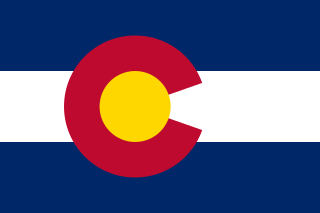
Colorado is a state of the Western United States encompassing most of the southern Rocky Mountains as well as the northeastern portion of the Colorado Plateau and the western edge of the Great Plains. It is the 8th most extensive and 21st most populous U.S. state. The estimated population of Colorado was 5,695,564 on July 1, 2018, an increase of 13.25% since the 2010 United States Census.

Indiana is a U.S. state located in the Midwestern and Great Lakes regions of North America. Indiana is the 38th largest by area and the 17th most populous of the 50 United States. Its capital and largest city is Indianapolis. Indiana was admitted to the United States as the 19th U.S. state on December 11, 1816. Indiana borders Lake Michigan to the northwest, Michigan to the north, Ohio to the east, Kentucky to the south and southeast, and Illinois to the west.
The Prohibition Party (PRO) is a political party in the United States best known for its historic opposition to the sale or consumption of alcoholic beverages. It is the oldest existing third party in the US. The party is an integral part of the temperance movement. While never one of the leading parties in the United States, it was once an important force in the Third Party System during the late 19th and early 20th centuries. It declined dramatically after the repeal of Prohibition in 1933. The party's candidate received 518 votes in the 2012 presidential election and 5,617 votes in the 2016 presidential election. The platform of the party is liberal in that it supports environmental stewardship, women's rights and free education, but is conservative on social issues, such as supporting temperance and advocating for a pro-life stance.
The Foundation (not to be confused with the American Prohibition Foundation) is part of the organizational structure of the Prohibition party, other components of which are the Prohibition National Committee, the Partisan Prohibition Historical Society, the Prohibitionists Caucus, the Action!, and all state and local affiliates.
The American Prohibition Foundation is a Colorado corporation created in 2002 by a faction of the Prohibition Party headed by Earl Dodge. It is not associated with the National Prohibition Foundation which was originally incorporated in Indiana in 1952. Both foundations exist to promote the work of the temperance movement and prohibition.
This page is based on this
Wikipedia article Text is available under the
CC BY-SA 4.0 license; additional terms may apply.
Images, videos and audio are available under their respective licenses.

The United States presidential election of 1884 was the 25th quadrennial presidential election, held on Tuesday, November 4, 1884. It saw the first election of a Democrat as President of the United States since 1856. Governor Grover Cleveland of New York defeated Republican James G. Blaine of Maine.

The temperance movement is a social movement against the consumption of alcoholic beverages. Participants in the movement typically criticize alcohol intoxication or promote complete abstinence (teetotalism), with leaders emphasizing alcohol's negative effects on health, personality, and family life. Typically the movement promotes alcohol education as well as demands new laws against the selling of alcohols, or those regulating the availability of alcohol, or those completely prohibiting it. During the 19th and early 20th centuries, the temperance movement became prominent in many countries, particularly English-speaking and Scandinavian ones, and it led to Prohibition in the United States from 1920 to 1933.
The Scottish Prohibition Party was a minor Scottish political party which advocated alcohol prohibition.

A ban is a formal or informal prohibition of something. Bans are formed for the prohibition of activities within a certain political territory. Some see this as a negative act and others see it as maintaining the "status quo". Some bans in commerce are referred to as embargoes. Ban is also used as a verb similar in meaning to "to prohibit".
Earl Farwell Dodge, Jr. was a long-term temperance movement leader and a politician of the Prohibition Party, from the U.S. state of Colorado.

James Franklin Hanly was an American politician who served as a congressman from Indiana from 1895 until 1897, and was the 26th Governor of Indiana from 1905 to 1909. He was the founder of Hanly's Flying Squadron, which advocated prohibition nationally and played an important role in raising awareness about the effect of alcohol and arousing public support for prohibition.

Rum-running, or bootlegging, is the illegal business of transporting (smuggling) alcoholic beverages where such transportation is forbidden by law. Smuggling usually takes place to circumvent taxation or prohibition laws within a particular jurisdiction. The term rum-running is more commonly applied to smuggling over water; bootlegging is applied to smuggling over land.

James Black was an American temperance movement activist and a founder of the Prohibition Party. In 1872 Black was the first nominee of the Prohibition Party for President of the United States.
Drug policy reform, also known as drug law reform, is any proposed changes to the way governments respond to the socio-cultural influence on perception of psychoactive substance use. Proponents of drug policy reform believe that prohibition of drugs—such as cannabis, opioids, cocaine, amphetamines and hallucinogens—has been ineffectual and counterproductive. They argue that, rather than using laws and enforcement as the primary means to responding to substance use, governments and citizens would be better served by reducing harm and regulating the production, marketing, and distribution of currently illegal drugs in a manner similar to how alcohol and tobacco are regulated.
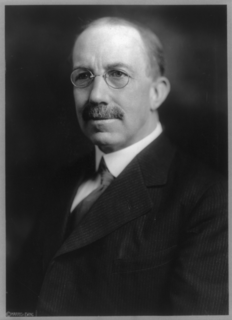
Wayne Bidwell Wheeler was an American attorney and longtime leader of the Anti-Saloon League. The leading advocate of the prohibitionist movement in the late 1800s and early 1900s, he played a major role in the passage of the Eighteenth Amendment to the United States Constitution, which outlawed the manufacture, distribution, and sale of alcoholic beverages.
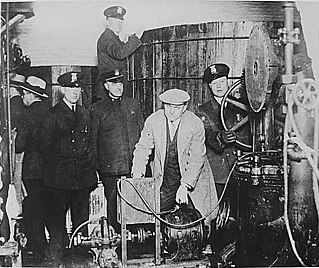
Prohibition in the United States was a nationwide constitutional ban on the production, importation, transportation, and sale of alcoholic beverages from 1920 to 1933.
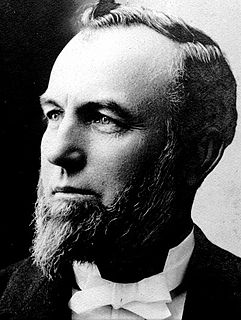
Reverend Charles Eugene Bentley was a third party candidate for president of the United States in 1896.
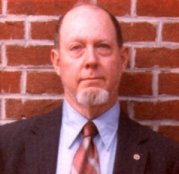
James "Jim" Hedges is an American politician who is a Prohibition activist and the former Tax Assessor for Thompson Township, Fulton County, Pennsylvania. He holds the distinction as the only individual to be elected to public office from the Prohibition Party in the 21st century, and the first since 1959. Hedges was the Prohibition Party's 2016 presidential nominee.
Andrew Nathan Johnson (1876–1959) was a Methodist minister. He was born in Jackson County, Kentucky and attended Asbury College in Wilmore.

The Prohibition of Child Marriage Act 2006 came into force on 1 November 2007 in India. In October 2017, Supreme Court of India gave a landmark judgement criminalising sex with a child bride, hence removing an exception in India’s criminal jurisprudence which had until then accorded legal protection to men who raped their minor wives.
The National Prohibition Party was a minor party in the United Kingdom which advocated the prohibition of alcohol.
James A. Edgerton was an American poet, philosopher and political activist from Alexandria, Virginia, United States. Edgerton was the vice-presidential nominee of the Prohibition Party in the 1928 presidential election. He was on the ticket alongside presidential nominee George Varney. Edgerton defeated former Prohibition Party State Representative from Illinois Frank S. Regan by a 68–29 margin. Edgerton urged that his own ticket be withdrawn in states where it could have hurt the chances of Herbert Hoover's election to the presidency. Hoover favored prohibition, whereas his Democratic opponent, Al Smith, was well known for his anti-prohibition views. Varney and Edgerton were only on the ballot in seven states. The Prohibition Party in California refused to support their party's nominee and nominated the Republican ticket on Prohibition ballot line instead.












